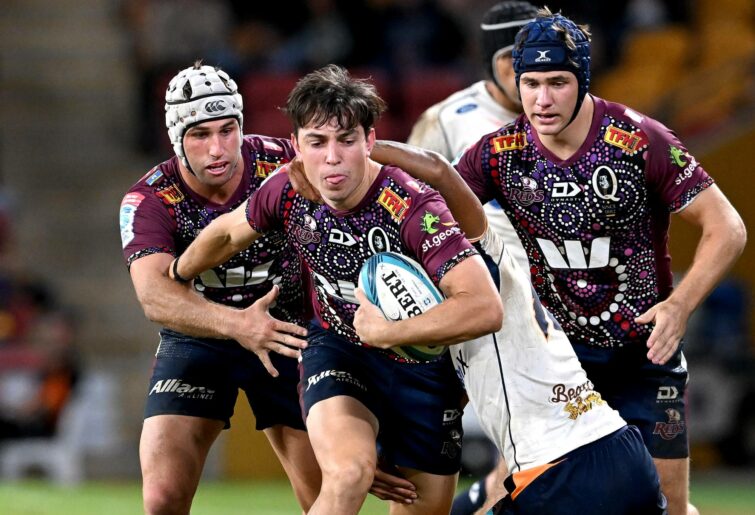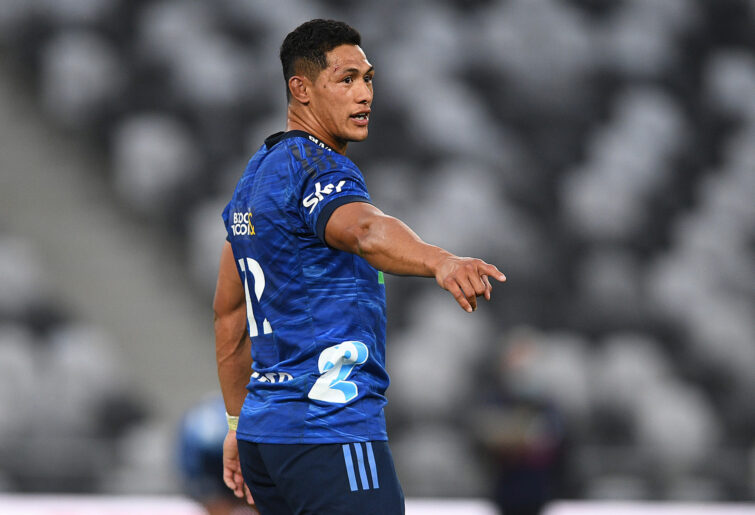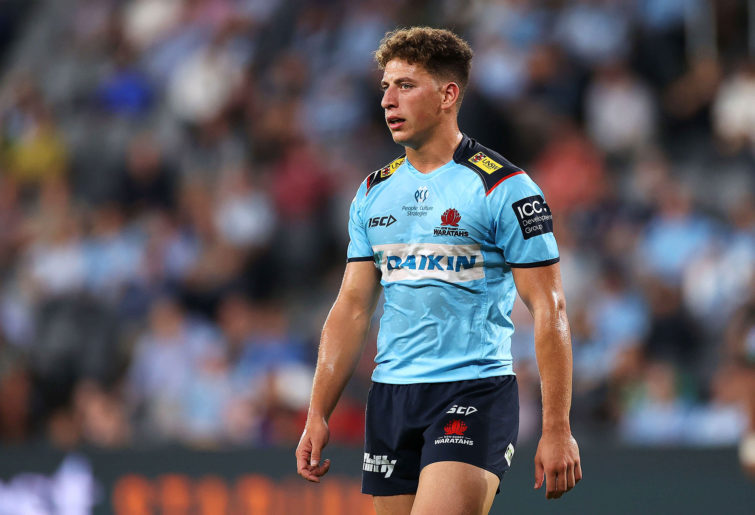
As they say in the classics, it’s been one hell of a week.
Turns out Craig Kelly didn’t become prime minister after all; old Frank ’n Furter himself, actor Craig McLachlan, opted to keep his democracy sausage on the barbie instead of having it splashed across the national media; and Monkeypox showed up, just in time to save our chief health officers from slipping into irrelevancy.
Oh, and the Blues and Brumbies fought their way right through the mother of all dogfights in Canberra, split only by a Beauden Barrett drop-goal after the siren. More on that thrilling, absorbing contest later.
The Crusaders were careful to say all of the respectful things after pasting the Fijian Drua, 61-3 in Christchurch, and to be fair, the Drua were by no means as inept as what that score-line might suggest.
More simply, the score was a reflection of one of the title favourites playing well, shifting the point of attack until space was found on the overlap, and a new side without the class of player and a robust enough set piece, to foot it with them.
This kind of result fuels the fires of those who ridicule Super Rugby for having lost its competitive edge, and indeed, there’s no sugar-coating the difference between a ten-times champion and a rookie side with no priors at this level.
But if one takes the view that matches like these are the price to be paid for tapping into a rich rugby resource that has supplied the French competition for years, and now promises a potential long-term benefit for Super Rugby, whilst enhancing the development of rugby from our region, within our region, then it begins to make more sense.
Coming off four straight losses, yet displaying a curious lack of intensity, the Reds had uber-competitive halfback Tate McDermott to thank for keeping a safe distance between themselves and Moana Pasifika, 34-22.
Already impeded by injury, the Reds lost James O’Connor and Josh Flook, and travel the tough road to Christchurch next week looking like a side not getting enough out of its front five, and too ill-disciplined to have a meaningful influence in the finals.
Moana Pasifika improved on last week, but struggled with their option taking, spending too much of the game refusing to pass the ball to their outstanding winger Timoci Tavatavanawai while he was in space, and twice grubber-kicking into touch when holding a 15 v 13 numerical advantage.
Their biggest work-on however, is their set piece. Improve this during the off-season, and there will be more wins in store, in 2023
In Hamilton, the Chiefs were always in control against the Force, closing the match out 54-21. The Chiefs have a made a habit in recent times of providing multiple try-scorers, and this time it was the turn of Quinn Tupaea, who scored three.
With Brodie Retallick due to return, the Chiefs are pulling themselves back together at the right end of the season and will be a handful in the finals.
For their part, the Force head to Auckland to play their postponed match against Moana Pasifika on Tuesday, still with a realistic chance of claiming the last finals spot, albeit requiring the Rebels to upset the Highlanders next Sunday.
There’s no secret to how to approach Moana Pasifika; with a decent line-out of their own, if the Force can be clinical on their ball, and attack every single Moana Pasifika throw like their lives depend on it, the win should be theirs.

Disrupted by a number of late changes, the Hurricanes did things comfortably enough against the Rebels, winning by 45-22.
The Rebels suffered throughout from being unable to slow the Hurricanes ball, their disjointed defensive line too often allowing runners to get in behind the first point of contact. That was an invitation for the Hurricanes to play more directly than they often do, surging forward in waves and recycling before the defence could reset.
With the ball, the Rebels showed an ability to do the same, and their three tries were all well taken. An obvious improvement in their ball-movement and continuity over the season provides them with a platform to build on for next year.
For those wondering what has ‘gone wrong’ with last years’ Wallabies star Andrew Kellaway, the answer is; nothing. Usually a right winger, Kellaway has twice stepped into centre in recent weeks, to provide cover for where the team needed it.
Had Kellaway been stationed as per normal, he would have left Westpac Stadium with three tries to his name, and not a bad word said. None of which is meant to decry the efforts of Lukas Ripley; while all three tries were straightforward finishes, the twenty- year-old is a prodigious talent.
After the Brumbies’ Round 12 win in Hamilton, coach Dan McKellar was insistent that for his side to beat New Zealand opposition, the physical contest had to be won first. Knowing what his own side could do – and was prepared to do with respect to putting their bodies on the line – the Brumbies also took their cue from the way the Force harried the Blues into error and confusion in Perth.
That ‘double-edged’ approach came at a heavy cost, with referee Damon Murphy losing patience with the Brumbies’ persistent infringing under pressure, reeling off penalty after penalty, before dispatching both Folau Fainga’a and Darcy Swain to the sin bin in a torrid first half.
Somehow, the Blues couldn’t make it hurt on the scoreboard; a combination of the Brumbies’ tenacious defending and aggression at set piece, and some dumb luck, resulting in several near misses and players held up over the try-line.
Finally, on the stroke of half-time, Stephen Perofeta found a hole for Beauden Barrett to stroll through, but if the Blues thought that was an indication that matters would open up in the second half, they were sadly mistaken.
There was only more of the same; the Brumbies’ defensive effort pushing Barrett deeper and deeper into the pocket, from where his ineffective kicking was little more than catching practice for Andy Muirhead.
Beside him however, Roger Tuivasa-Sheck enjoyed his best match in a Blues jumper, relishing the intense physicality, and along with some strong efforts from some of his pack and winger Mark Telea, kept the Blues on the front foot.
The Brumbies were starved of opportunity on attack, but when their chance came, they turned to their trusted lineout maul; two well-executed tries handing them the lead with under two minutes to play.
That should have been the end of it but, conscious of not giving away a penalty for latching while trying to run down the clock, the Brumbies were picked off, and the Blues were good enough to find their way to the goalposts, from where, to a chorus of boos aimed at referee Murphy, Barrett delivered the dagger blow.

An unhappy Alan Ala’alatoa suggested afterwards that he’d be waiting by the phone this week for an apology from referee’s boss Mitch Chapman, but if I were him, I wouldn’t be holding my breath.
True, the breakdown was a mess all night, as were the scrums, and it can be very hard for players to get a read on things when there are sometimes breakdown penalties blown, and other times, a free-for-all allowed to go on unchecked.
But to be fair to Murphy, when two sides turn up to scrap over every blade of grass, flood into every breakdown and consider every single ball in dispute, it’s hard to imagine any referee managing to keep all stakeholders happy – particularly the side under pressure, doing the majority of the defending.
Blues and All Blacks prop Ofa Tu’ungafasi, isn’t a man to waste words or exaggerate. Questioned by Stan Sports’ Sonny-Bill Williams after the heart-stopping 21-19 win, he drolly described the match as “difficult”. That’s a bit like describing Nic White as mildly excitable.
The Blues have now won a franchise record 12 matches in a row and are guaranteed home ground advantage for as long as they stay in the finals. This was as stern a test as any side could wish to undertake and survive, and while there was only a whisker in it at the end, the self-belief they take back to Eden Park will be enormous.
With the Brumbies falling agonisingly short it was left to the Waratahs to fly the Australian franchise flag, putting the Highlanders away convincingly, 32-20 on Sunday, to move above the Reds on the ladder.
Leaving their main man Jed Holloway at home, the Waratahs struck a nice balance between backs and forwards, and even though they conceded early, they were never really in danger of losing.
The match marked the return of favourite son Ned Hanigan, whose second half cameo was full of energy, while winger Mark Nawaqanitawase again showed that he is a greatly improved player this season.

Admittedly, the Waratahs were aided by the sending off of Highlanders’ flyhalf Sam Gilbert, for tipping Michael Hooper on his head, in the first half. When blatantly reckless acts like these are punished only with a 20-minute red card, it can be no surprise that SANZAAR is losing the argument with World Rugby on this topic.
After last week’s comments around the need for investment in professional women’s rugby, there was an announcement during the week from the AFL, trumpeting massive pay increases for AFLW players, to the point where players, under a new collective bargaining agreement, will be earning an average of $46,000 (up to $72,000) for a ten-week season, plus finals.
With NRLW players expected in 2023 to earn between $40,000 – $60,000, the challenge for Rugby Australia is obvious. Not only does money need to be found from somewhere, it needs to be found fast.
This predicament highlights the intense level of competition rugby faces from other domestic sports, a situation amongst leading rugby nations, unique to Australia.
All these sports face a chicken v egg situation whereby it can be argued that current playing standards and commercial returns do not warrant throwing that sort of money at players who are effectively part-timers.
But it is clear that the investment must be made first. English and French rugby have done this, and are streets ahead as a result. With AFLW and NRLW heading down the same path, without something close to parity, women’s rugby in Australia risks being left at the starting blocks; struggling to attract junior and amateur participants, and without access to the best elite athletes.